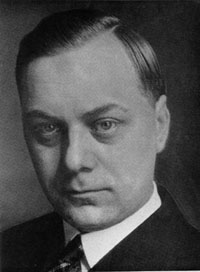Alfred Rosenberg
|
|
Alfred Rosenberg (January 12, 1893–October 16, 1946) was a Nazi ideologist and politician.
Born to ethnic German parents in Tallinn, Estonia, he studied architecture at the Riga Technical Institute and engineering at Moscow University, completing his Ph.D. studies in 1917. During the Russian Revolution, he supported the counter-revolutionaries and, following their failure, Rosenberg emigrated to Germany in 1918. Rosenberg was one of the earliest members of the German Workers Party (later the National Socialist German Workers Party, better known as the NSDAP or the Nazi Party), joining in January 1919; Hitler did not join until October 1919.
Rosenberg became editor of the Völkischer Beobachter (National Observer), the Nazi party newspaper, in 1921. In 1923 after the failed Beer Hall Putsch, Hitler appointed Rosenberg leader of the Nazi Party, a position the latter occupied until Hitler was released from prison. Though Rosenberg was probably flattered by being chosen, Hitler remarked privately in later years his choice was strategic, based more on Rosenberg's weak personality and lack of self-motivation than anything else. Hitler did not want the temporary leader of the Nazi party to be a very popular or power-hungry man, as a person with either of the two qualities might not want to cede the party leadership after Hitler's release.
In 1929, Rosenberg founded the Militant League for German Culture. He became a Reichstag deputy in 1930 and published his book on racial theory The Myth of the Twentieth Century (Der Mythus des 20. Jahrhunderts). He was named leader of the foreign political office of the NSDAP in 1933 but played little actual part in office. In January 1934 he was deputized by Hitler with responsibility for the spiritual and philosophical education of the NSDAP and all related organizations.
Rosenberg created a "Special Task Force for Music" (Sonderstab Musik) to collect the best musical instruments and scores for use in a university to be built in Hitler's hometown of Linz, Austria. The orders given the Sonderstab Musik were to loot all forms of Jewish property in Germany and of those found in any country taken over by the German army and any musical instruments or scores were to be immediately shipped to Berlin.
In 1940 he was made head of the Hohe Schule (literally "high school"), the Centre of National Socialistic Ideological and Educational Research. Following the invasion of the USSR Rosenberg was appointed head of the Reich Ministry for the Occupied Eastern Territories. Alfred Meyer was his deputy and represented him at the Wannsee Conference. Another official of the Ministry, Georg Leibbrandt, also attended the conference, at Rosenberg's request.
Rosenberg was captured by Allied troops at the end of the war. He was tried at Nuremberg and found guilty of conspiracy to commit crimes against peace; planning, initiating and waging wars of aggression; war crimes; and crimes against humanity. He was sentenced to death and executed with other guilty co-defendants at Nuremberg on the morning of October 16, 1946.
He is considered the main author of key Nazi ideological creeds, including its racial theory, Lebensraum, abolition of the Versailles Treaty, and persecution of the Jews and of Christian churches.
Rosenberg was married twice. He married his first wife, Hilda Leesmann, in 1915; after eight years of marriage, they divorced in 1923. He married his second wife, Hedwig Kramer, in 1925; the marriage lasted until his death. He and Kramer had two children; a son, who died in infancy, and a daughter, Irene; who was born in 1930. His daughter has, in the past, refused contact with anyone seeking information about her father.
External links
- Alfred Rosenberg (http://us.imdb.com/name/nm0742169/) at the Internet Movie Databasede:Alfred Rosenberg
he:אלפרד רוזנברג nl:Alfred Rosenberg fi:Alfred Rosenberg sv:Alfred Rosenberg

